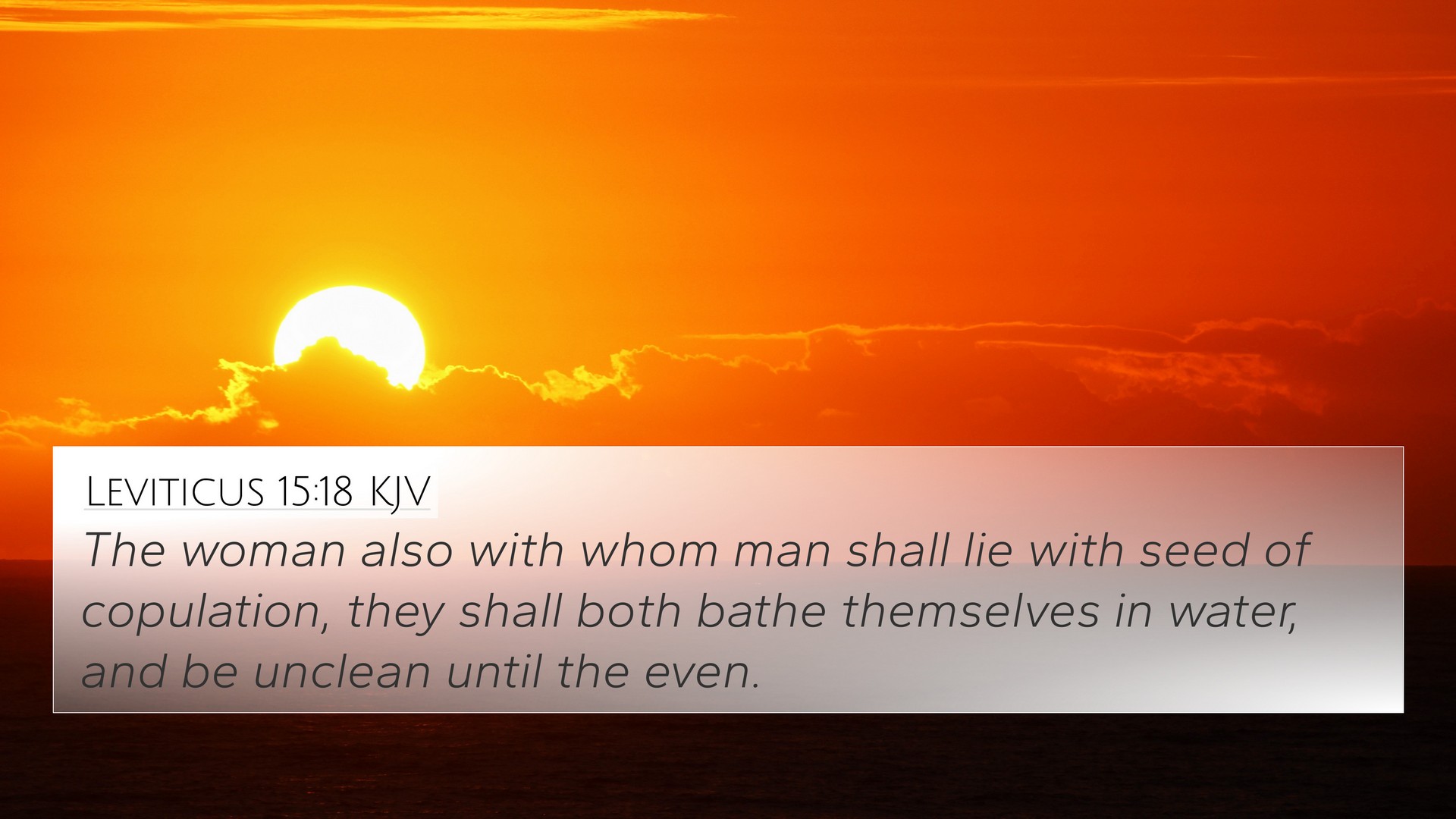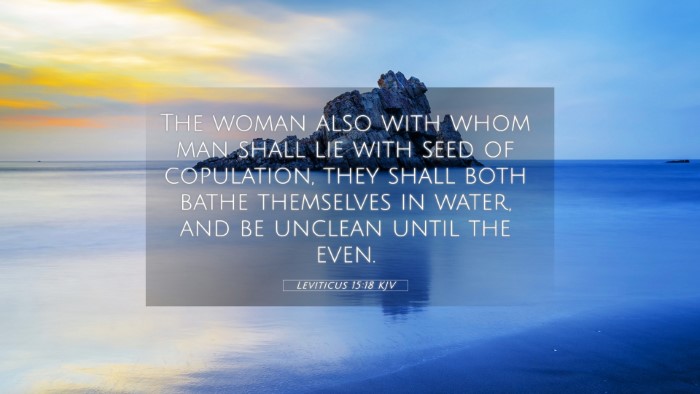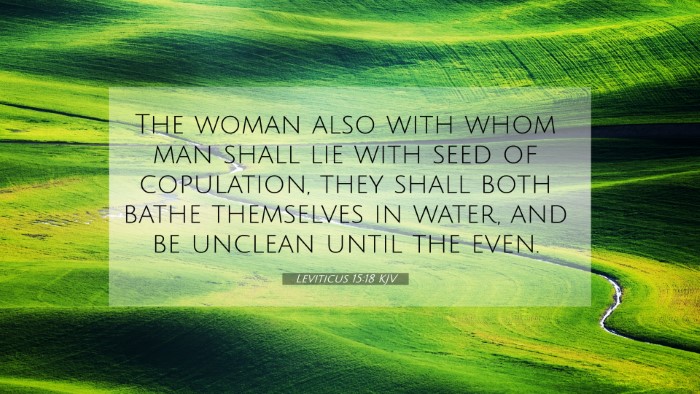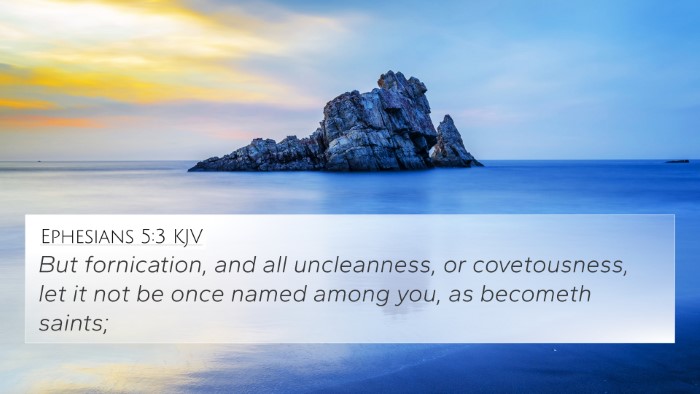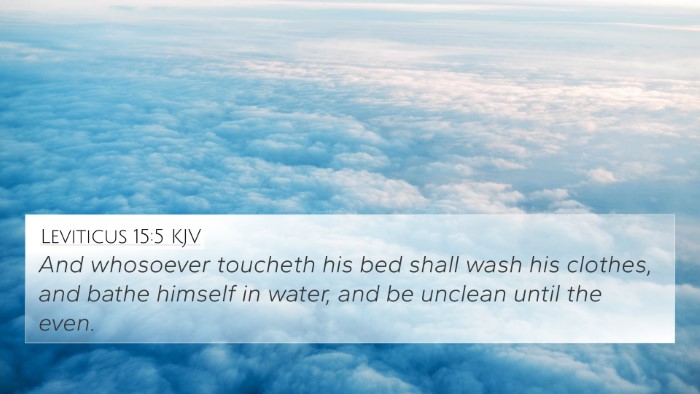Understanding Leviticus 15:18
Bible Verse: Leviticus 15:18 states, "The woman also with whom man shall lie with seed of copulation, they shall both bathe in water, and be unclean until the even."
Summary of Meaning
This verse addresses the purity laws concerning bodily emissions and sexual relations. Leviticus, part of the Mosaic Law, includes detailed regulations intended to maintain ceremonial cleanliness among the Israelites. This particular command emphasizes the importance of ritual purity, not only signifying physical cleanliness but also encompassing spiritual significance in the context of the covenant community.
Commentary Insights
Matthew Henry's Commentary: Matthew Henry reflects on the implications of sexual relations within the Israelite community and how such acts create a temporary state of uncleanness. He suggests that these laws serve to highlight the sanctity of marriage and sexual intimacy while reminding the community to maintain their holiness before God.
Albert Barnes' Notes: Barnes elaborates on the ceremonial law's function, indicating that these regulations were not merely about physical hygiene but also a symbolic representation of moral and spiritual purity. Sexual activities, where a seed is produced, necessitate a purification process, showcasing the importance of being ritually clean when approaching God.
Adam Clarke's Commentary: Clarke discusses the context and cultural implications of the law, noting it was designed for the Israelites who were to be a holy nation. He emphasizes that complying with these laws governed how they lived their everyday lives and helped distinguish them from surrounding nations.
Cross-References
Leviticus 15:18 connects with several important verses throughout the Bible. Here are 7-10 notable cross-references:
- Leviticus 11:44-45: Discusses the call to be holy as God is holy and emphasizes the significance of cleanliness.
- Hebrews 13:4: Speaks about the sanctity of marriage and the importance of preserving its purity.
- 1 Corinthians 6:18-20: Warns against sexual immorality, reinforcing the body’s sanctity as the temple of the Holy Spirit.
- 1 Thessalonians 4:3-5: Exhorts believers to abstain from sexual immorality and honor God in their bodies.
- Exodus 19:10: Discusses the sanctification of the people before encountering God at Mount Sinai.
- Ephesians 5:3: Encourages believers to avoid sexual immorality, aligning with the moral imperatives found in Leviticus.
- Matthew 5:27-30: Jesus reinterprets the laws regarding adultery, stressing the heart’s intent.
- Galatians 5:19-21: Lists acts of the flesh, including immoral behavior, in opposition to the fruits of the Spirit.
- 2 Corinthians 6:17: Calls the faithful to separate themselves from unrighteousness, similar to the regulations for cleanliness in Levitical law.
- Romans 12:1-2: Encourages believers to present their bodies as living sacrifices, a theme complementing the purity laws of Leviticus.
Thematic Connections
This verse offers themes that align with overarching biblical narratives regarding purity, holiness, and the human condition. The requirements here foreshadow the deeper spiritual truths expressed in the New Testament, where physical laws transition into moral imperatives that govern the hearts and behaviors of believers.
Comparative Bible Verse Analysis
The comparative analysis between Leviticus 15:18 and New Testament teachings illustrates a continuous dialogue through Scripture concerning the concepts of purity, morality, and the transformative power of Christ. As believers study these themes, they discover a rich tapestry of understanding regarding how God’s directives for His people evolve while remaining rooted in the principles of holiness.
Tools for Bible Cross-Referencing
Utilizing tools such as a bible concordance or a bible cross-reference guide allows readers to delve deeper into these connections. These resources can greatly enhance one's Bible study experience and facilitate a comprehensive understanding of inter-Biblical themes.
Conclusion
Leviticus 15:18, while contextual to the early Israelite community, holds timeless truths applicable to the life of faith today. Understanding the ritual laws of the Old Testament, alongside the transformative teachings of the New Testament, enriches one’s spiritual journey, enabling a deeper grasp of God’s call to holiness.
